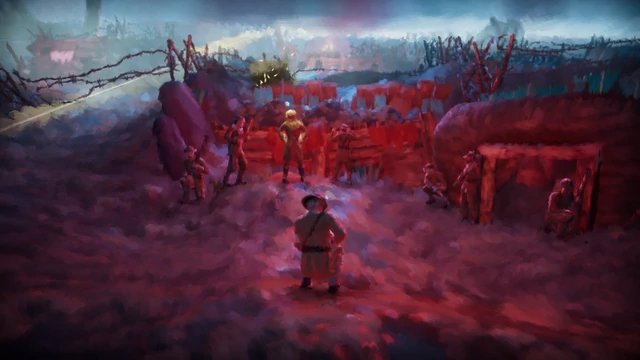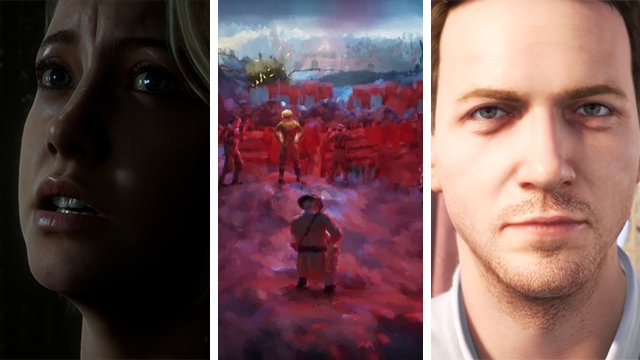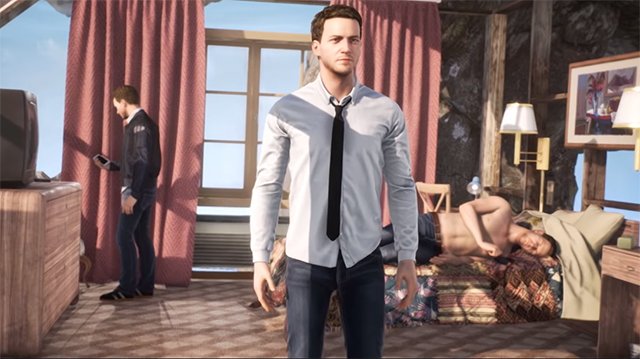Games like Life is Strange, Detroit, and Until Dawn have shown the hunger for good narrative-based games. Bandai Namco much have wanted a piece of the action (ironically) because they showed three different types of those games at Gamescom 2018: Man of Medan, 11:11 Memories Untold, and Twin Mirror. Each has a different spin on the genre and, judging by my hands-on time with them, are all promising in their own ways.
Gamescom 2018: Man of Medan

I played the Man of Medan demo four and had a slightly different experience in each run. I’d expect nothing less from Supermassive Games, the studio behind the underrated slasher classic Until Dawn. Man of Medan isn’t a slasher but it heavily draws from that well and is more of a basic horror game.
The portion I played took place on an abandoned World War II freighter with Fliss, Brad, and Dan (the other characters weren’t in the demo). After an incredibly brief synopsis of the prior few hours, it threw me into the Fliss’ shoes. Well, actually she had no shoes on, showing that something obviously went sideways before I had tuned in. Her luck didn’t rebound, given that Dan had a gun pointed at my back and was coaxing her to move ahead in the dark, decrepit hallways of the ship.
It took this tense situation as an opportunity to start slowing seeding the game with even more tension. Fixed camera angles allowed Supermassive to play with what I saw and what I thought I had seen, which felt reminiscent of the first three Resident Evil games. And it worked just as well as it did back then with only the fraction of the awkward movement controls. Despite the parameters of playing in a brightly lit room with other people, I was creeped out. Scaring people is hard to do even in the dark, privacy of their homes, let alone in public.
Collectibles scattered about the ship tell the story of the soldiers that inhabited it but also may help you on your journey ahead. Like Until Dawn, I found a premonition totem (which showed me a vision of what could happen in the future) and a knife on one of the many corpses. While the former was only a warning, the blade had a more practical effect as it saved me as I failed one of the so-so quick time events. On my knifeless run, I wasn’t as lucky and died struggling.
That sort of cause and effect showed up in other parts of the game too. Sometimes you’ll get rational and emotional dialogue choices. Picking emotional at the start let me walk with Brad in the beginning whereas he surprised me later on when I picked the rational path. He even showed up at two different points in my rational playthrough, depending on whether I went down an optional path or not.
The branching paths in the tiny portion of Man of Medan I played seems to be taking all the right lessons from Until Dawn. It’s part of the new Dark Pictures anthology series so it’s unlikely that it’ll be a full $60 experience (Supermassive plans on releasing two a year). But if it’s a shorter story that keeps the butterfly effect-like structure while sewing in some more great tension and fantastic visuals, then it will probably be good enough for me. And this demo, combined with Supermassive’s horror pedigree, makes me incredibly excited to see more when it comes out in 2019 for the PS4, Xbox One, and PC.
Gamescom 2018: 11:11 Memories Retold

11:11 Memories Retold is a drastic departure from Man of Medan but similarly focuses on story. The game follows Kurt, a German technician, and Harry, a Canadian photographer, as they get drafted into World War I. It’s told through a visual style slightly reminiscent of Vincent van Gogh that cleverly hides avoids the uncanny valley and possibly crude character models. Everything looked fuzzy, yes, but also it gave the game an incredibly vibrant and unique look.
That whimsical style combated the ugliness of World War I. Harry signs up to take pictures in the war to stave off the monotony of normal life, but it quickly seems as though he’s been tricked into an early death. Kurt’s reason is much more sad, as he enlists to look for his son who went missing in battle.
Video games don’t usually attempt to humanize both sides of a war, which makes sense given the medium’s obsession with World War II. And you can’t ever side with Nazis so that immediately rules out sympathizing the other side for that conflict. World War I is more muddled and 11:11 seems to be taking advantage of that.
But before it dropped me into battle, it gave me a few minutes of walking around as both Kurt and Harry to appreciate their normal lives. Kurt’s playtime was longer, which showed how he had to mull it over. Harry’s was not, symbolizing how quickly he got thrusted into the war.
That quiet time gave proper contrast to the inevitable battlefield it threw me into. It kicked off in the Battle of Vimy Ridge, a real life skirmish that took place in April 1917. Harry was tasked with following the commanding officer, allowing the player to frame propaganda-like pictures that will glorify the war and hide its horror. Kurt’s objectives on the opposite side of the trenches felt a little more like busywork as they often revolved around him being the errand boy, fetching water and more machine gun rounds for the other soldiers.
The game used clever transitions to move from Harry to Kurt. For example, the perspective would shift from Kurt to Harry as a German sniper next to Kurt popped one of Harry’s fellow Canadian allies. Well-acted inner monologues also fill out the time as you’re walking between set pieces, feeling appropriately like detailed journal entries from one of the most brutal modern wars.
The nuanced storytelling and novel setup piqued my interest but the cliffhanger ensured that I would have to see how it all played out. That’s a high compliment for a narrative-based game where the story is the main point of the game. It’s releasing on November 9 for the PC, Xbox One, and PS4, meaning it’ll just miss the centennial anniversary of Germany’s surrender in WWI. We’ll have to wait until that date to see if it just misses (or hits) its mark too.
Gamescom 2018: Twin Mirror
Developer Dontnod is behind Twin Mirror but you might not know that by glancing at it. It looks vaguely like Quantum Break with some of the weird, surreality of Alan Wake or Twin Peaks. But instead shooting dudes, you play as Sam, an investigative journalist with an ability to piece together crime scenes using his stupidly named “Mind Palace.” Despite its dumb name, this is where Dontnod’s style comes through and puts an novel twist on otherwise typical adventure game.
Sam awoke in a hotel room, hungover, shirtless, and still in his jeans like a drunk dumbass. Instead of having just a pounding headache, he finds his bloodied shirt in the bathroom, signalling that the previous night was not all fun and games. This sent him to his aforementioned Mind Palace, which is an ethereal mental projection full of disparate floating pieces of debris.
The hotel room materialized and allowed Sam to run through what happened during his blackout. You can switch over to the real world at any time to find more clues and run through more plausible scenarios. For example, after finding your phone and the TV remote in the real world, you can decide in the Mind Palace what you did before you went to bed that night. Every clue lets you run down a different scenario until you find the right one.
And while I can’t speak for the whole game, that’s where it might run into trouble. It could have just been a simple tutorial level but it won’t be as satisfying if you have to find the objectively correct path to move on. In the short term, I enjoyed compiling the clues to figure out what happened. But I fear that, in the long run, it could become mindless as you run through every option until you’re told you have the right one. Balancing player choice and difficulty is tricky and although getting led by the nose isn’t always bad, it neuters the ability to critically think if the game requires a specific path.
Twin Mirror shares the promise of the prior two games but also makes me a tiny bit hesitant. Possible gameplay roadblocks aside, Dontnod’s writing usually gets upended by hacky lines and tacky moments and a 15-minute demo can’t speak much to that either way. Sam was a bit of a goober, but the line between endearing goober and annoying goober is hard to walk and even harder to suss out in a short preview. Despite the potential to be too guided and have cornball dialogue, the detective gameplay was intriguing and the characters didn’t give me any immediate red flags. We’ll just have to wait to visit our own Mind Palaces in 2019 to piece together how it went wrong or how it triumphed.








